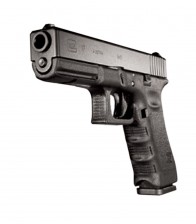Palace OKs P1-B pistol deal, but sets new bidding for rifles
The long and short of it is that the assault rifles that the Philippine National Police wanted to buy were overpriced and the pistols it sought to acquire were not, officials said Monday.
Deputy Director General Emelito Sarmiento, chief of the PNP bids and awards committee (BAC), said the plan to purchase assault rifles was aborted after the late Secretary Jesse Robredo ordered it stopped.
However, there’s no stopping the implementation of the P1-billion contract for the purchase of 60,000 Glock 17 (Generation 4) 9mm pistols awarded on Aug. 31 to Glock Asia Pacific Ltd. and its local partner, Trust Trade.
The notice of award appears to be in order, according to Malacañang, which reiterated President Aquino’s earlier directive to stop the bidding process for a separate contract for rifles.
“Remember, we don’t have problems with the pistols—the (ones manufactured and distributed by) Glock. There’s no problem with the bidding on the Glock. It was the bidding on the rifle that the President has some concerns,” the President’s spokesperson, Edwin Lacierda, said at a Palace briefing.
Article continues after this advertisementOnline search
Article continues after this advertisementLacierda said the President had discovered, when he checked online via Google search, that a rifle would cost half the price being offered by the remaining bidder.
Sarmiento said Robredo called the committee secretariat on June 25 and ordered the suspension of the bidding process for P408 million worth of M4 assault rifles.
“Of course, we followed (Robredo’s) order although it was already moot and academic by that time (for the first batch of rifles to be purchased),” Sarmiento said.
He explained that when Robredo gave the order, the committee had already considered R. Espinelli, the lone bidder for the first batch of 1,500 M4 assault rifles (worth P178 million).
The bidder was later disqualified for failing to submit the required documents. “The bidder was disqualified within that period … June 26 or June 27. The bidding process did not proceed because there was a failed bidding,” Sarmiento said.
“We then followed (Robredo’s) order for the second batch (of rifles),” he said.
Second batch
Sarmiento said the bidding for the second batch of 1,800 M4 rifles worth P230 million was also suspended because the committee had discovered that the rifles were available at a lower price.
“We suspended the invitation to bid. The second batch was referred back to the (PNP) Directorate for Logistics so that the price could be studied further,” he said.
“In short, no procurement materialized. We stopped this,” he said.
Incoming Interior Secretary Manuel Roxas is expected to begin a new round of bidding for the rifles.
Lacierda said the bidding for the rifles would not continue because the President stopped it. The President has ordered an investigation of the bidding for the rifles.
The bid price was P80,000 per rifle, but the President was surprised to discover that the price had actually gone down to P40,000 per rifle.
Lacierda said the original price of the rifle was P150,000 per piece, but this was later reduced to P119,000. When it was being considered by the Aquino administration, the price was further reduced to only P80,000, he said.
Gas piston rifles
Sarmiento explained that the rifles were priced at P80,000 each because the PNP had wanted to get more modern “gas piston” rifles.
“We wanted gas piston rifles. But now, we’re going back to gas (operated) rifles so that we can buy more units,” he said.
The President also complained that while he had ordered the bidding process stopped, “somehow, some portion reached the post-evaluation process.”
“This is because the bids were opened on May 30 while Secretary Robredo called our secretariat (only) on June 25,” Sarmiento said.
Puno’s role
The head of the BAC said Interior Undersecretary Rico Puno was not a member of the committee and “did not influence” it in its decisions.
“He would sit with us because he is the undersecretary for peace and order. He sits as our overseer, but we are very independent. He did not influence us,” Sarmiento said.
“I’m the chair of the committee and I have four other generals as members. We vote to reach our final decisions,” he added.
Sarmiento said he was not aware of Puno’s supposed attempt to exempt the arms deal from public bidding rules. “I am not aware of that but we did everything based on public bidding. There was no negotiated bidding,” he said.
“Negotiated bidding was done before, but we’ve learned our lesson,” he added.
Process, not person
The Palace, however, gave ambiguous statements on Puno’s liability in the arms deal.
“What we know is that what is being investigated now is the process itself—the BAC. What happened to that BAC? The DILG is investigating the BAC. I don’t know if there is any (investigation) of Usec Puno,” Lacierda said, invoking the oft-repeated line of the Palace that what was being investigated was the process itself, not necessarily the liability of persons involved.
“So the President asked the DILG, ‘What is the competence of the bids and awards (committee)?’ So he was looking into the process itself. He was investigating the process. But in the meantime, while investigating the process, he already told Secretary Jesse Robredo to stop that bidding and it was stopped,” Lacierda said.
But the official was also mum on reports that before Robredo’s death, he had already informed the President that Puno was under investigation for the overpriced rifles.
“I am not aware of any such statement or statement of Secretary Jesse Robredo to the President,” Lacierda said.
“What now appears is it’s as if he’s the focus of the investigation. But those investigations are all confidential. We don’t even know if he is the subject of an investigation,” he added.
